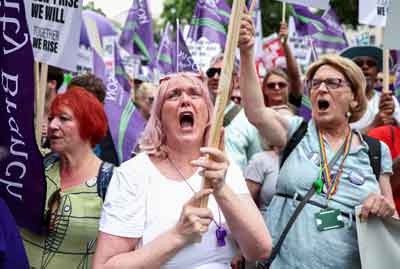Here Comes The Violent Summer Of Soaring Dollar Discontent
Elwin de Groot
 In this climate of rising inflation, particularly of energy and food, and global central banks in tightening mode, a (political) crisis never is very far away. Sri Lanka has been one of the most prominent examples with its recent default on foreign debt and its President Gotabaya Rajapaksa fleeing the country yesterday has been one of the most prominent examples. Bad economic policy, the Covid-19 shock and, ultimately the global food and energy crisis resulting in serious shortages, tipped the country over the edge. Protests also broke out in Libya earlier this month, where rising ‘cost of living’ problems were cited as one reason. According to FAO statistics, a staggering 29.4% of the world’s population was facing moderate or severe food insecurity in 2020 (up from 25% in 2015) a figure which probably did not improve in recent years. In this climate of rising inflation, particularly of energy and food, and global central banks in tightening mode, a (political) crisis never is very far away. Sri Lanka has been one of the most prominent examples with its recent default on foreign debt and its President Gotabaya Rajapaksa fleeing the country yesterday has been one of the most prominent examples. Bad economic policy, the Covid-19 shock and, ultimately the global food and energy crisis resulting in serious shortages, tipped the country over the edge. Protests also broke out in Libya earlier this month, where rising ‘cost of living’ problems were cited as one reason. According to FAO statistics, a staggering 29.4% of the world’s population was facing moderate or severe food insecurity in 2020 (up from 25% in 2015) a figure which probably did not improve in recent years.
But the crisis in Sri Lanka also points to broader risks stemming from currency volatility. For one, the strong dollar has its mirror image in a sharp depreciation of many currencies around the world. There is hardly any developing/emerging market currency that has escaped the stronger dollar. Bear in mind also that dollar-claims (loans and debt securities) on the non-financial sector in emerging markets and developing countries reached a record of nearly USD 4 trillion last year, after more than a decade of easy monetary policy. As such currency volatility in developing markets is something is unlikely to disappear in the foreseeable future.
Of course the biggest eye-catcher in recent days has been the euro, which yesterday, truly, dipped below the magical parity level. It’s hard to forgive investors that bearish sentiment - with the market now basically split 50/50 on whether the Fed’s next step will be a 75bp or 100bp hike after its last 75bp and the ECB not even having started hiking yet.
The Bank of Canada, clearly, did not hesitate, surprising the market by raising rates 100bp to 2.50% yesterday, where both analysts and traders had mainly expected a 75bp hike. As our own Christian Lawrence notes in his post-meeting comment, the Bank of Canada continues to be one of the most aggressive developed world central banks, having raised rates before the Fed, hiked 50bp before the Fed, and started QT before the Fed. The Bank is still confident it can engineer a soft landing, and a front-loaded hiking cycle is the best way to achieve that. But, the path to a soft landing has narrowed and the reduction in the growth outlook does imply some pain. We maintain our call for a 4% terminal rate at the December meeting, although the BoC did suggest that the peak would be slightly above neutral which it sees as between 2-3%.
Against that backdrop, yesterday’s US CPI report hammered home the message that the Fed may need to do more (even though we know that monetary policy works with a considerable lag). Headline inflation pushed to 9.1% in June, more than the consensus (8.8%) had been forecasting. Although President’s Biden’s reaction was that that number, whilst being “unacceptably high” was “also out of date” [given the sharp fall in commodity prices since mid-June], we do note that these surprises has been one of the most consistent patterns this year. In fact, the 0.3%-points surprise (compared to the Bloomberg median) was at the high-end of that range and matched the surprise for May. Energy and food were both significant contributors as were – again – (new and used) vehicle prices. Although core inflation edged down in y/y terms (from 6% to 5.9%) that number -too- came in above expectations.
Returning to the weakness of the euro, the political situation in Italy is not providing any support for the single currency. Indeed, it cannot be excluded that the government of PM “whatever it takes” Draghi falls today in a confidence vote. The key reason is tensions within Draghi’s own coalition which basically floats on the left-wing Five Star Movement M5S, led by Giuseppe Conte, the right-wing Lega, led by Matteo Salvini and the centre-left PD. Salvini already raised the pressure earlier this year. In an interview with Italian paper Corriere Della Sera on 15 June he argued that the government’s balance has moved “too much to the left” on many dossiers, such as taxes, pensions, immigration and justice, warning that he would make up its mind on whether to leave the coalition on September 18, which is when the Lega holds its annual rally.
But this time around it is Conte’s M5S that is trying to saw the legs from under Draghi’s chair. Conte told lawmakers yesterday that his party would boycott a confidence vote on an economic aid package today. In response, Draghi has thrown in his full weight, warning that he would resign if Conte walks out of the vote. The aid package intends to provide further support to businesses and households hit by high energy prices. Conte has compared it to “writing a blank check”; it is our understanding that his grievances are not so much over the support itself, but rather the limited influence his lawmakers have had in the deliberations over the aid packages. The need to differentiate the M5S from the rest of the coalition evidently owes to the poor performance in the polls.
Although this nuances things, tensions have unexpectedly quickly turned into a high-stake game that may soon see the announcement of snap elections, unless Conte backs down or President Mattarella steps in to broker a repair of the coalition through talks. This may well be the preferred route for everyone. For, whilst Conte may be playing hardball, it remains to be seen whether coalition parties are ready for such early elections. Polls suggest that the far-right Brothers of Italy would come out on top if elections would be held right now. The worsening financial position of households only has strengthened their chances of winning such elections, since they are basically the only big opposition party.
That said, the political tensions in Italy suggest that the ECB’s Anti-Fragmentation Tool (or Transmission Protection Mechanism) could not have come any sooner, as the heated-up political debate is likely to weigh on sentiment vis-à-vis Italian bonds. Equally, though, one could argue that a political crisis only makes the ECB’s balancing act more complicated, as we would not be surprised if the hawks take this as evidence that any such tool is fraught with risks, such as the ECB falling hostage to politics.
 Elwin is heading the macro strategy team consisting of strategists covering the global economy and markets. His personal focus areas include the European economy and financial markets. Elwin is heading the macro strategy team consisting of strategists covering the global economy and markets. His personal focus areas include the European economy and financial markets.
The team covers the main areas of G7 economics, money markets, foreign exchange and fixed income research. The European economy and financial markets, including ECB monetary policy are his key areas of attention. He joined Rabobank in 2006.
Being a seasoned speaker, Elwin gives many presentations and lectures for various client groups of Rabobank, including institutional investors and large corporates. He also regularly appears in the national and international press.
research.rabobank.com
|




